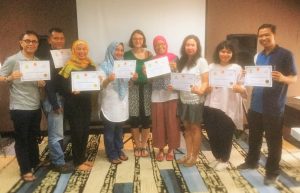By Adi Wahyu Adji with contributions from all of the C4C Indonesia participants[1]

A simple ceremony on 26th November 2017 marked the end of my year at “civil society consultant school”, with the graduation of the first cohort of consultants from the Consultants for Change (C4C) programme, sponsored by the NAMA Foundation and facilitated by INTRAC.
For me, this programme has changed many things. I have developed competence as a consultant for NGOs and civil society, but have also experience great personal development in the last year. “Consultancy with soul” is the primary message from the programme. This means that consultancy with civil society is not merely about meeting a deadline, earning fees or paying lip service to deep ideals. Together the consultant and the client need to scale a “mountain of change” that is not easy. Simply speaking, this is what a consultant for civil society should be: someone whose obvious purpose is not to profit for personal wealth but whose purpose is positive change.
In Indonesia such consultants are needed. Indonesian civil society organisations (CSOs) have experienced a rapid change in the past 20 years. It is estimated that there are now over 100,000 CSOs, working across various development fields.[2] Indonesia has graduated from a low-income to middle-income country and is the largest economy in south-east Asia. Widening democratic space and an expanding middle class provide both challenges and opportunities. The opportunities include expanding demands for CSOs services in providing public goods to society, and increasing disposable income for philanthropy. CSOs are also expected to continue advocating for policy changes on behalf of disadvantaged or under-represented groups in existing democratic institutions and processes.
The Indonesian participants in C4C have identified four challenges faced by Indonesian CSOs:
- The shifting focus of traditional donors, such as Official Development Agencies ODAs and family-founded philanthropy, to other geographical areas outside Indonesia, or by direct engagements with Government agencies (G2G). It creates limitation in the availability of funding, and more competition among CSOs.
- The increasing role of private sectors, through corporate-based philanthropy and Corporate Social Responsibility (CSR), in providing services directly to beneficiaries without using CSOs as intermediaries.
- The increasing indication of social piety which consequently increases faith-related types of fundraising and services. This may lead to more fragmented public services which, without conscientious handling, can potentially increase intolerance within society.
- The increasing role of social media in mobilising youth for social purposes. The characteristics of such engagement are focusing on a single issue, short-term, and demanding different accountability mechanisms.
In dealing with poor quality of public services and their impacts, including increased intolerance within the society, CSOs in Indonesia must maintain ‘on the ground’ working approaches to empower society to take more meaningful roles in social accountability. Progressive organisational and capacity development is necessary for Indonesia’s CSOs to continue performing and responding to the society’s needs within the changing development landscape.
From the C4C programme, I learned a lot about knowing myself (self-reflection) and understanding the essence of “consultancy with soul”. Lessons learnt include knowing advantages and disadvantages of different approaches so I know which way to go, learning how to pace myself for what is possible, and learning to surrender to what cannot be grasped. This is all very personal, but that is where the strength lies. If you plan to solve other people’s problems it is even more appropriate to look at yourself first.
Luckily I am not the only one to complete the programme. There are no less than 37 other people from Indonesia, Lebanon, Palestine, Tanzania and Kyrgyzstan who completed this one year C4C programme trip. They came from different backgrounds, ages, cultures, experience levels, and characters, and this just makes us more aware that there is no privilege greater than the diversity itself.
It is now time to start something new, giving back to others from what we have been given. Now the C4C Indonesia fellows will pool their expertise and resources to deliver the services that CSOs in Indonesia critically need to address the gaps in public service provision and social accountability.
[1] The reflections on the CSO context in Indonesia are taken directly from a group assignment completed by all the C4C Indonesia participants so a special thanks is extended to Adisti Ikayanti, Rizal Malik, Melina Margaretha, Syarifah Marlina, Irma Martam, Ibnu Mundir and Revyani Sjahrial for its inclusion in this blog.
[2] Kemendagri, 2010. “Ada 100 ribu lebih Ormas di RI” (http://www.kemendagri.go.id/news/2010/04/20/ada-100-ribu-lebih-ormas-di-ri). Accessed on 2 October 2017.
Photo: C4C Indonesia Participants © Adi Wahyu Adji 2017.